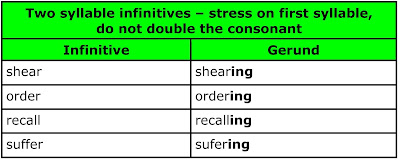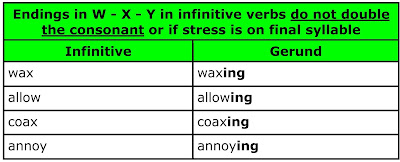El gerundio se compone agregando al verbo la partícula -ing. Ej.: la forma de gerundio del verbo close es closing. Además, entre otras particularidades que se explicarán, se puede utilizar un gerundio como sujeto, complemento de una oración.
Examples:
- I am starting (start + ing) college next year.
- I would be joining (join + ing) you later on.
- I am not starting (start + ing) college next year.
- I would not be joining (join + ing) you later on.
Gerunds: formed with double consonant / Gerundios: formados con doble consonante
El gerundio duplica la consonante, en los casos en que el verbo infinitivo termina en una "consonante + vocal + consonante", agregamos a la consonante final añadiendo -ing
Tenga en cuenta que son verbos de una sola sílaba, stop - stopping
Ejemplo: stop (t-o-p ⟺ consonante + vocal + consonante), se duplica la consonante, resultado: stopping.
Examples:
La excepciones son los verbos infinitivos de dos sílabas y los que terminan en W - X - Y que se verá más abajo.
- He is skipping breakfast (Él se está saltando el desayuno).
- They were robbing next to my house (Estaban robando al lado de mi casa).
- She was chatting for a long time (Ella estuvo charlando durante mucho tiempo).
Gerunds after infinitive verbs with two syllable endings -stress on the first syllable, do not double the consonant (the infinitive remains the same, just add -ing).
Los gerundios a partir de verbos infinitivos con dos sílabas -con acento en la primera sílaba, no lleva doble consonante (el infinitivo permanece igual, sólo añadir -ing).
Vamos a poner más ejemplos aclaratorios, los verbos infinitivos con dos sílabas no duplican la consonante. Vea ejemplos a continuación:
Endings in W - X - Y in infinitive verbs do not double the consonant or if stress is on final syllable.
Las terminaciones en W - X - Y en verbos infinitivos no llevan doble consonante o si el acento o énfasis recae en la sílaba final.
- I am waxing in the abstract about the universality and transcendence of art (estoy divagando sobre la universalidad y trascendencia del arte).
- The president is allowing foreign interference in our affairs (El presidente está permitiendo la interferencia extranjera en nuestros asuntos.
- He's annoying them (Él los está molestando).
Los verbos infinitivos que terminan en -e ⟶ se elimina la -e y se añade -ing. Ej.: love - loving
- He is loving his way of life (Él está adorando su forma de vida).
- The photographer is taking all the gear with him (El fotógrafo se está llevando todo el equipo con él).
- They have been faking the ballot results (Han estado falsificando los resultados de la votación).
Verbs ending in -ie (die - dying), change to -ying / Los verbos con terminación en -ie (die - dying) cambian -ying.
- He is dying in hospital, as a result of the car accident (Él se está muriendo en el hospital, como resultado del accidente automovilístico).
- She is lying, there is a conclusive evidence (Ella está mintiendo, hay una evidencia concluyente).
- He is vying for the world title (Está compitiendo por el título mundial).
When verbs end in "consonant + vowel + L", double the final L adding -ing (marvel - marvelling).
Cuando los verbos terminan en "consonante + vocal + L", se dobla la L final añadiendo -ing (marvel - marvelling).
Tenga en cuenta que Estados Unidos (EE.UU.) no se suele doblar la L en el gerundio, travel - traveling
Examples:
travel ➯ travelling ✦ marvel ➯ marvelling ✦ expel ➯ expelling
- She was travelling around Greece (Ella estaba viajando por Grecia).
- They were marvelling at the panorama and views of valley (Estaban maravillados con el panorama y las vistas del valle).
- The director is expelling him from school, because of his bad behaviour (El director lo está expulsando de la escuela, debido a su mal comportamiento).
Verbs ending in a stressed vowel + R, double the final R adding -ing (defer - deferring).
Los verbos que terminan en una vocal acentuada + R, se duplica la R final añadiendo -ing (defer - deferring).
Examples
confer ➯conferring ✦ bar ➯barring ✦ char ➯charring ✦ refer ➯referring ✦ defer ➯diferring
- Charring is a chemical process (La carbonización es un proceso químico).
- I am referring to your attitude (Me estoy refiriendo a tu actitud).
- You are barring the possibility of progress (Estás excluyendo la posibilidad de progreso).
Verbs ending in an unstressed vowel + R, do not double the final R an add -ing
Los verbos que terminan en una vocal no acentuada + R no se duplica la R final y se añade -ing
Examples:
alter ➯altering ✦ bear ➯bearing ✦ clutter ➯cluttering ✦ bother ➯bothering
- The government is altering politics (El gobierno está alterando la política)
- We are bearing a lot of emotions (Estamos soportando muchas emociones).
- She is bothering him all the time (Ella lo está molestando todo el tiempo).
Gerund used as a subject / El gerundio como sujeto de la oración
- Fishing is one of my hobbies (La pesca es uno de mis pasatiempos).
- Watching TV makes him very happy (Ver la televisión lo hace muy feliz).
Gerund used as direct object / El gerundio utilizado como complemento directo
- I like speaking with my dad (Me gusta hablar con mi padre).
- Our team preferred not to challenge the opponent (Nuestro equipo prefirió no desafiar al oponente).
Gerund used as object of the preposition / El gerundio como complemento de la preposición
- Ashley got into mess for talking to the boss. (Ashley se metió en un lío por hablar con el jefe).
- Upon finding his fingerprints in the house, the detective arrested him (Al encontrar sus huellas dactilares en la casa, el detective lo arrestó).
Gerund used as a predicate noun / Gerundio utilizado como predicado nominal
- Players always believe in competing (Los jugadores siempre creen en competir).
- My hobby is watching TV (Mi pasatiempo es ver televisión).


